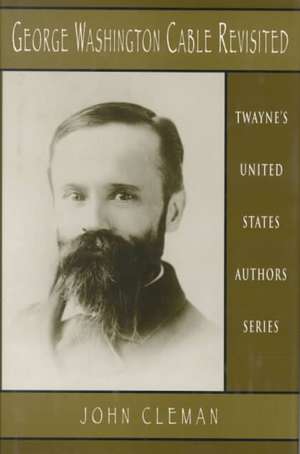United States Authors Series: George Washington Cable Revisited: Twayne's United States Authors, cartea 0655
Autor John Clemanen Limba Engleză Hardback – 31 ian 1996
Din seria Twayne's United States Authors
-
 Preț: 462.02 lei
Preț: 462.02 lei -
 Preț: 462.79 lei
Preț: 462.79 lei -
 Preț: 460.29 lei
Preț: 460.29 lei -
 Preț: 314.33 lei
Preț: 314.33 lei -
 Preț: 464.15 lei
Preț: 464.15 lei -
 Preț: 466.27 lei
Preț: 466.27 lei -
 Preț: 375.22 lei
Preț: 375.22 lei -
 Preț: 464.92 lei
Preț: 464.92 lei -
 Preț: 373.47 lei
Preț: 373.47 lei -
 Preț: 374.45 lei
Preț: 374.45 lei -
 Preț: 461.64 lei
Preț: 461.64 lei -
 Preț: 461.48 lei
Preț: 461.48 lei - 23%
 Preț: 453.23 lei
Preț: 453.23 lei -
 Preț: 464.36 lei
Preț: 464.36 lei -
 Preț: 375.22 lei
Preț: 375.22 lei -
 Preț: 463.93 lei
Preț: 463.93 lei -
 Preț: 465.13 lei
Preț: 465.13 lei -
 Preț: 372.71 lei
Preț: 372.71 lei -
 Preț: 377.34 lei
Preț: 377.34 lei -
 Preț: 374.84 lei
Preț: 374.84 lei -
 Preț: 373.85 lei
Preț: 373.85 lei -
 Preț: 485.68 lei
Preț: 485.68 lei -
 Preț: 506.67 lei
Preț: 506.67 lei -
 Preț: 375.00 lei
Preț: 375.00 lei -
 Preț: 375.00 lei
Preț: 375.00 lei -
 Preț: 462.79 lei
Preț: 462.79 lei -
 Preț: 375.98 lei
Preț: 375.98 lei -
 Preț: 372.93 lei
Preț: 372.93 lei -
 Preț: 378.48 lei
Preț: 378.48 lei -
 Preț: 373.70 lei
Preț: 373.70 lei -
 Preț: 375.39 lei
Preț: 375.39 lei -
 Preț: 463.77 lei
Preț: 463.77 lei -
 Preț: 300.84 lei
Preț: 300.84 lei -
 Preț: 374.45 lei
Preț: 374.45 lei -
 Preț: 486.66 lei
Preț: 486.66 lei -
 Preț: 373.47 lei
Preț: 373.47 lei -
 Preț: 374.07 lei
Preț: 374.07 lei -
 Preț: 467.42 lei
Preț: 467.42 lei -
 Preț: 376.95 lei
Preț: 376.95 lei -
 Preț: 373.85 lei
Preț: 373.85 lei -
 Preț: 374.07 lei
Preț: 374.07 lei -
 Preț: 485.51 lei
Preț: 485.51 lei -
 Preț: 376.95 lei
Preț: 376.95 lei -
 Preț: 373.47 lei
Preț: 373.47 lei -
 Preț: 483.60 lei
Preț: 483.60 lei -
 Preț: 485.51 lei
Preț: 485.51 lei -
 Preț: 487.42 lei
Preț: 487.42 lei -
 Preț: 487.04 lei
Preț: 487.04 lei
Preț: 375.98 lei
Nou
Puncte Express: 564
Preț estimativ în valută:
71.94€ • 75.12$ • 59.41£
71.94€ • 75.12$ • 59.41£
Carte indisponibilă temporar
Doresc să fiu notificat când acest titlu va fi disponibil:
Se trimite...
Preluare comenzi: 021 569.72.76
Specificații
ISBN-13: 9780805739916
ISBN-10: 0805739912
Dimensiuni: 148 x 223 x 27 mm
Greutate: 0.39 kg
Editura: Twayne Publishers
Seria Twayne's United States Authors
ISBN-10: 0805739912
Dimensiuni: 148 x 223 x 27 mm
Greutate: 0.39 kg
Editura: Twayne Publishers
Seria Twayne's United States Authors
Textul de pe ultima copertă
When George Washington Cable toured the country giving readings with his literary peer Mark Twain, he was acknowledged as one of the major writers of his age. In the century since then, Mark Twain has come to be regarded as one of the premier American fiction writers of the period, whereas Cable the novelist and teller of Creole tales has largely been relegated to a quaint docket of literary history. A courageous pioneer of Southern literature and a heroic civil rights activist, Cable has recently been "rediscovered" and has settled into a relatively stable critical niche as an interesting minor writer whose early promise was never realized. In "revisiting" this important American writer, John Cleman provides a critical introduction to Cable's life and work, emphasizing the terms of his artistic achievement and focusing more attention on his fiction and political writing than on his social attitudes and reform activities - the issues to which most critics have gravitated. Cleman offers lengthy analyses of Old Creole Days (1879), Madame Delphine (1881), and especially The Grandissimes (1880), because these are the works on which Cable's reputation largely rests. Cleman also exposes the interest that Cable's lesser known or less successful books hold for students of his work and reveals what their weaknesses suggest about the unique quality of his overall achievement. It is the uniqueness of Cable's achievement - the complex allure and power of his best work - that Cleman most seeks to convey. In The Grandissimes, some of the Old Creole Days stories, and other works Cable writes with fascinating subtlety and complexity: his stories are alluring beyond subject matter and themes; they areprovocative yet defy any sort of explanation. Cable was a social critic and public figure, but he was also a considerable artist: his best stories and novels are among the finest, most satisfying, and important fiction written in the last three decades of the nineteenth century. Despite his limitations and unrealized promise, Cable remains a fascinating figure; as a Confederate soldier who eventually became a staunch advocate for the civil rights of African Americans in the Reconstruction South, he was a curious and unique phenomenon. His civil rights essays in The Silent South (1885) and The Negro Question (1890) are valuable not only for their reminder of the necessity of adhering to democratic principle and avoiding the folly of expediency but also for their insight into the transformation of slave culture into segregated culture. Ultimately, Cleman finds that Cable's best work deserves to be read, admired, and studied both as a precursor to the Southern literary tradition of William Faulkner, Robert Penn Warren, Eudora Welty, and Carson McCullers and for the pure pleasure it affords.
